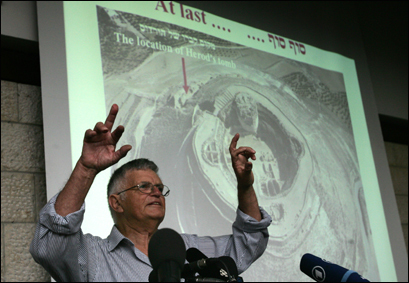Thursday, 31 May 2007
The trouble begins when Jews stop being invisible
May 31, 1997
Matthew Kalman
Later this month, BBC's Omnibus will broadcast a documentary on the Hampstead Garden Suburb in north London. This bold experiment in 1920s suburban living has become an exclusive, largely white, middle-class enclave whose tree-lined streets and smart, red-brick houses have become a magnet for comfort-seeking residents as diverse as Lulu, King Constantine, Lord Soper, Martin Bell, the Sultan of Brunei and Richard & Judy.
A large part of the programme is devoted to the controversy surrounding the eruv, a plan to erect a symbolic boundary around several square miles of north London, including parts of the Garden Suburb.
According to orthodox law, Jews are not permitted to push …
Tuesday, 8 May 2007
Herod's tomb reportedly found inside his desert palace
 Standing in front of a projected image of a mesa rising more than 2,475 feet above sea level, Israeli Professor of Archaeology Ehud Netzer speaks during a press conference at the Hebrew University of Jerusalem 08 May 2007. Netzer said that the tomb of King Herod, famed for expanding the Jewish second temple during his reign in the first century BC, had been discovered in the Israeli occupied West Bank, some 7.5 miles south of Jerusalem. (Menahem Kahana/AFP/Getty Images) |
BOSTON GLOBE | May 8, 2007
By Matthew Kalman, Globe Correspondent
JERUSALEM -- The tomb of King Herod, the legendary Jewish monarch and ally of the Romans who ruled at the time of Jesus' birth, has been discovered in one of his palaces 2,000 years after his death, the Hebrew University of Jerusalem announced last night.
A Hebrew University team found the grave at Herodion, a stunning volcano-shaped desert fortress 5 miles southeast of Bethlehem. The team was led by Professor Ehud Netzer, who has been researching the site since 1972.
Herod the Great ruled the ancient kingdom of Judea from around 37 BC to 4 BC.
He built lavish palaces, seaports, aqueducts, and temples, including the magnificent Temple Mount in Jerusalem, the Tomb of the Patriarchs in Hebron, and the vast Mediterranean seaport complex and hippodrome at Caesarea.
The massive stones of the outer wall of the Temple Mount still stand today in the Old City of Jerusalem, where they are known as the Western Wall.
He also constructed an elegant winter palace on the north face of Masada, an imposing mesa overlooking the Dead Sea where Jewish rebel forces held out for a year against three Roman legions, decades after Herod's death.
Herodion, a series of underground tunnels hewn out of a mountain and topped with a magnificent palace complete with bathhouses, is regarded as one of the most astonishing engineering feats of the ancient world.
Herod was descended from the Edomites, a tribe of ancient enemies of the Jews who converted to Judaism in about 120 BC. When Palestine was under Roman rule, Herod's father became chief minister of Judea. Herod was made governor of Galilee when he was just 25 years old.
After the assassination of Julius Caesar, Herod became a protege of Mark Antony and Caesar's great-nephew Octavian.
In 39 BC, Herod invaded Judea to win the country back for the Romans and was made king.
The location of Herod's grave has long been a mystery among archeologists. The Roman historian Josephus Flavius wrote that Herod was buried at Herodion, but the grave had not been found until now. It seemed unlikely that a monarch who spent such huge sums on erecting monuments and palaces that have lasted for centuries did not plan his own colossal tomb.![]()
Tuesday, 1 May 2007
He won't be war casualty, Olmert vows
By Matthew Kalman Special To The News
JERUSALEM - Israeli Prime Minister Ehud Olmert was fighting for his political life last night after a damning report found him personally responsible for a series of "severe failures" in last year's war against Hezbollah in Lebanon.
But Olmert, who was elected with a large majority just over a year ago, said in a televised statement that he would not step down.
"It would be incorrect to resign and I do not intend to do so," he said.
"There were failures by the main decision-makers with myself at their head," Olmert admitted, but said he would work to correct the problems outlined in the 300-page Winograd Committee report.
Members of Olmert's governing coalition joined calls from opposition lawmakers for him to resign over his mishandling of the war in which more than 1 million Israelis were forced to flee their homes and live in underground shelters for a month as Hezbollah rained thousands of rockets on northern Israel.
More than 150 Israelis and 1,000 Lebanese were killed in the war, which began last July 12 when two Israeli soldiers were kidnapped and eight more were killed in a cross-border ambush by Hezbollah guerrillas.
The report accused him of making rushed decisions at the outset of the war, and for failing to consult with either military or nonmilitary experts.
Amid rumors of a growing mutiny within his own party and the possible fall of his coalition government, demonstrators began gathering outside Olmert's official residence in Jerusalem to demand his resignation.
The acid test will come Thursday, when critics have promised to bring hundreds of thousands of Israelis to a demonstration in Tel Aviv to force Olmert to quit.